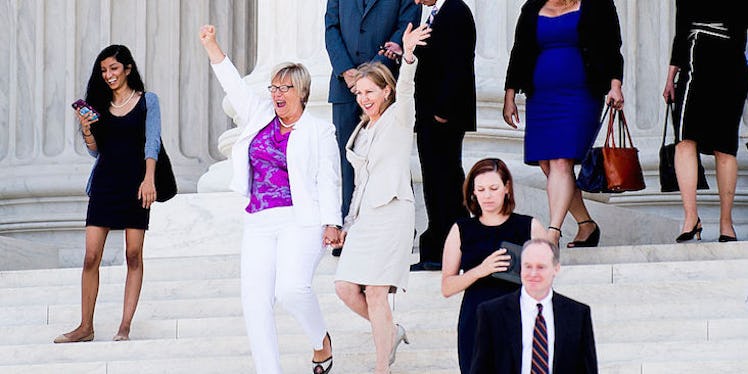
Supreme Court Abortion Case Winner On Its Anniversary: "Hope Is The Ultimate Rebellion"
On June 27, 2016, the Supreme Court made a landmark decision on abortion.
They ruled in favor of abortion access, striking down Texas laws that put an "undue burden" on women -- making abortions less accessible, but not safer.
That case was Whole Woman's Health v. Hellerstedt, and it's considered the most important abortion rights case in decades.
Whole Woman's Health is a health care group with locations around Texas. It was founded by Amy Hagstrom Miller, who serves as CEO. Last year, I visited their facilities in San Antonio and saw first-hand the compassionate care they provide, despite the restrictions Texas law imposed on them.
This week, I caught up with Hagstrom Miller about the past year -- and what she's paying attention to for the future of abortion rights and access.
Despite a seemingly rocky year for reproductive rights, Hagstrom Miller is hopeful for the future.
The Supreme Court decision last year looked like it was going to mark the start of a major turnaround for reproductive rights -- the Supreme Court reaffirmed the protection of abortion access, Hillary Clinton was heading towards a victory where she could've elected a pro-choice Supreme Court justice, a Democratic-majority Congress could've finally done away with the Hyde Amendment -- and then Election Day happened.
Donald Trump was elected after spewing ignorant falsities about abortion, and he got conservative Neil Gorsuch on the Supreme Court. A Republican-majority Congress is debating a healthcare bill that threatens abortion access, and Republican state lawmakers have been emboldened to introduce new abortion-restricting laws.
But, "hope is the ultimate rebellion," Hagstrom Miller says. She explains,
I am a hopeful person, and I always have been, and I still am. I mean, we smacked down the state of Texas in a way that was unprecedented. That kind of ruling hasn't happened in a generation. So the election of Trump, and all the crazy stuff that's happened since then, doesn't undo the fact that we set a really strong precedent for reproductive rights in this country.
The Whole Woman's Health case set a legal precedent, meaning courts have to follow it -- and we're still seeing the positive effects from that, especially on the state level.
Immediately after the ruling, restrictive laws in several states were struck down. These legal challenges are still happening around the country.
Hagstrom Miller believes we're going to see a lot of laws coming down in the upcoming year using the Whole Woman's Health precedent.
Whole Woman's Health itself already took on another Texas law, and Hagstrom Miller says she's more than prepared if they have to go for a third round against Texas lawmakers. She says,
I have a saying that in Texas, you can be angry but you can't be surprised. It's part of what our opposition is doing. They try to tie us up in courts, they try to keep us in response mode.
Meanwhile, some facilities in Texas that were forced to close by the laws the Supreme Court struck down have reopened. Whole Woman's Health reopened their Austin flagship clinic this past spring. Hagstrom Miller says of that experience,
It was the best thing I could give my team, this ability for them to come together and be able to reopen that office after all that we went through.
Hagstrom Miller is more concerned about the culture the Trump administration allows than the vague possibility of overturning Roe v. Wade.
Hagstrom Miller says,
I'm fundamentally not worried about Roe being overturned as much as I'm worried about the change in the Supreme Court and the sort of anti-woman aggression from the federal level, from the White House, creating an atmosphere that's tolerant of these kind of restrictions and blatant misogyny. An increased tolerance of hatred towards a lot of people, women included.
She testified at the Supreme Court nomination hearings against Gorsuch, voicing concern about Gorsuch's unclear stance on abortion rights (he has not ruled in an abortion case, although he has ruled against birth control access).
Anti-abortion people have accepted "they're not going to be successful overturning Roe," Hagstrom Miller contends, but they have introduced laws that "can kind of render Roe meaningless," like the ones she's fought.
So although she's not worried about Roe itself getting overturned, she is concerned about how those state laws would be handled -- particularly if a Supreme Court justice retires and Trump gets to nominate someone else. That would tip the scales in the court. They're currently fairly balanced, with Justice Anthony Kennedy as a sort of swing vote.
Ultimately, Hagstrom Miller is celebrating today, and she's determined to continue to fight for women.
She says,
I see women's access to safe abortion services as a part of a much bigger thing. I see this as a very compelling humans rights and justice issue, in that if we don't have the ability to have bodily autonomy and control our fertility, we're not able to engage in society with full equality.
She's working with two nonprofits that you can get involved with as well -- Shift and the Whole Woman's Health Alliance.
Hagstrom Miller says,
My sort of promise to myself and to the movement is that we know [legal fights are] going to be part of what we have to engage in, but we're also not going to let it consume us. ... We have a huge win, and we know that a vast majority of Americans support women's access to abortion, and we know that the care we offer is good. So a majority of my energy is going to go toward caring for patients and doing the right thing, but knowing that a percent of what we do is always going to have to go towards fighting back against legislature.
The fight for full access is not over, but Hagstrom Miller doesn't seem at all daunted.